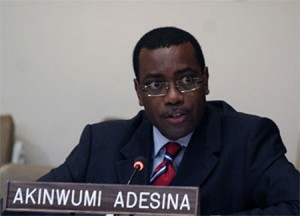
Decades ago, oil replaced agriculture as the goose that lays the revenue, thereby ending the relationship between farmers and government.
Farmers have remained in rural areas, mainly operating, in smallholding units, a labour-intensive, inputs-deprived and loss-making agriculture that also suffers from value chains poverty. Government has stayed in urban seats of power handing out essential input subsidies its officials take for themselves and making ineffectual agricultural policies.
Oil’s inability to create economic development, shrink the high unemployment level, and conversely, agriculture’s continued claim to the title of the largest employing sector and contributor to the GDP has made it imperative for government to attempt to make up with farmers.
So far, the agricultural policy of President Jonathan, run by an energetic Minister of Agriculture and Rural Development, Dr Akinwunmi Adesina, has been changing Nigerian agriculture.
The primary focus on making inputs subsidies efficient has eliminated the strong hold corrupt government officials had on inputs distribution and marketing. In 2011, government provided a N30 billion loan facility at 7 per cent interest rate to private inputs dealers that replaced government officials, to ensure their survival and growth.
The e-wallet, an electronic version of smart subsidies it used last year to distribute fertilizer efficiently to biometrically verified farmers cost N5billion. The bill in the old mode of distribution normally totalled N30 billion.
Smart subsidies are the subsidies that are efficiently distributed such that only targeted beneficiaries benefit. They negate the conventional notion that subsidies simply succumb to corruption and fail as government is never involved in their distribution.
Malawi runs a voucher version. In the Nigerian version, farmers get SMS alerts about the quotas of fertilizers that have been allocated to them. They take the pins to private input dealers to claim it and buy more fertilizers.
Government stirred the country a few days ago when newspapers reported that it plans to expand the e-wallet, and to distribute mobile phones to 10 million farmers with N60 billion. There was derision, with people wondering whether mobile phones were of more immediate use to farmers than fertilisers and tractors. ANPP said it is an attempt to buy up farmers’ votes towards the 2015 elections.
The plan is a good plan however. Among its merits, it is gender-equitable, as 5 million of the mobile phones will be distributed to female farmers. Dr Adesina has denied newspaper reports that it will cost the country N60 billion. Still, it is very important he states the exact cost of the plan for accountability. Otherwise, it might make more sense for government to provide guaranteed micro loans to farmers, directed especially towards mobile phones purchases, through microfinance banks and functioning cooperatives.
If carried out properly and distributed to real farmers, the mobile phones will not only serve as means through which farmers will have timely access to inputs and increase agricultural productivity, extension officers will also find it easier, faster and more effective to disseminate vital information to farmers.
Another positive technological externality is the radical change rural economies and sociologies will undergo as telecoms providers extend their services to rural areas. The Ministry of Communication Technology is reportedly liaising with them to aid the agricultural plan.
The mobile phones will serve as effective linkage that has been missing between farmers and the government for a long time, and do more.
ANPP needs to do away with all the anger and get working towards the next elections by proposing good policies it would use on the other troubles of the agricultural sector and how it would implement them.
Yemi Soneye holds a BTech degree in Agricultural Economics and Extension from Ladoke Akintola University of Technology, Ogbomoso. His articles have appeared in Think Africa Press, Daily Times Nigeria and The New Black Magazine.
